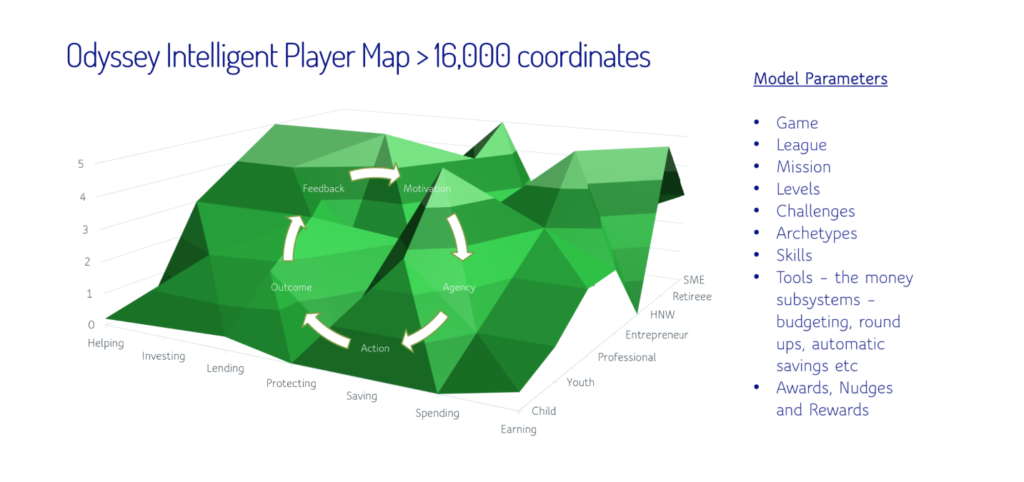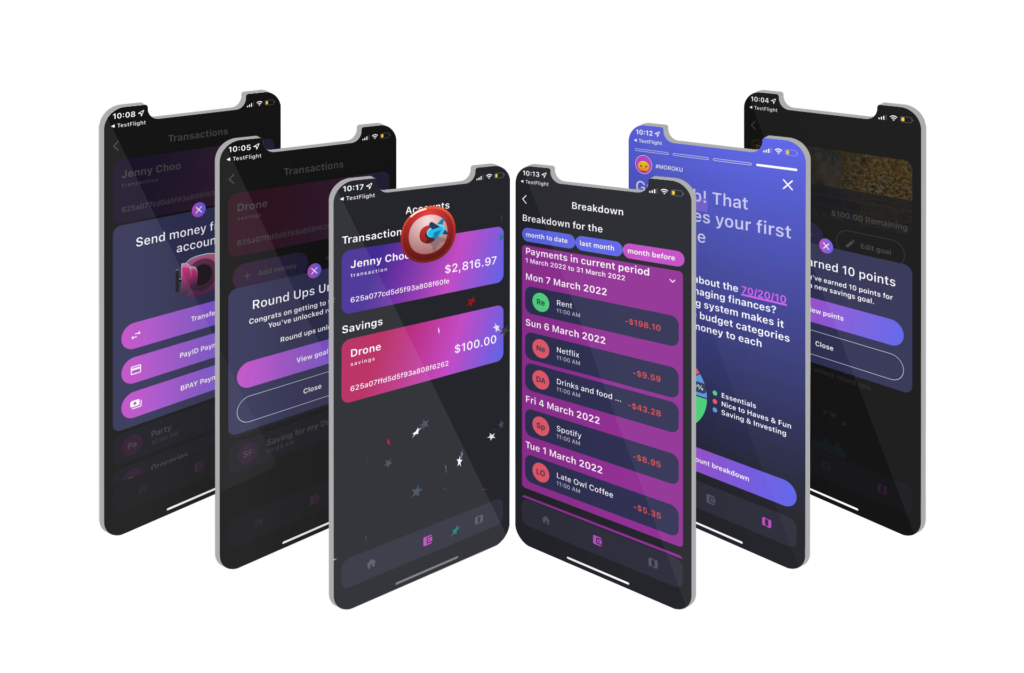Serious games (SGs) are being used ever more frequently in education, training and domains such as sport and health care. A serious game is a game designed for a primary purpose other than pure entertainment. Second Life, was one such example in which users can create actual businesses that provide virtual commodities and services for Linden dollars, which are exchangeable for US currency. In spite of the growing interest towards SGs, their spread within financial services has been limited. Moroku’s early development of GameSystem was unable to scale across the numerous use cases brought about by the complexity of the industry.
In order to create economies of scale, a set of common and fundamental functionalities are required and made available as services in the cloud. These services could be presented as a model that can be instantiated with different content in different contexts. Whilst formats create limitations, if they are well designed, they can provide a good opportunity for combining cost and development efficiency, along with the opportunity to develop a model that can scale across the complexities of the domain for effectiveness.
Open world SGs (OWSGs) are a particular class of Serious Games in which the players have to explore a virtual environment where information to be learnt is disseminated. The environment could represent human bodies, hospitals and geography, etc. In such games, players are typically asked to perform some tasks in relevant points of the environment, in order to get (by doing) or test knowledge about some specific subjects, according to the Task Based Learning (TBL) theory. Of course, accurate pedagogy is needed, not only in the SG design, but also in its use, as suggested by the latest findings of enhanced discovery learning.
With Odyssey, Moroku proposes a development framework for supporting investigation in OWSGs for application within real world financial services. This platform is aimed at providing a model that allows developers application designers and developers to build Serious Games for financial services in a structured and straightforward way. The model is processed at runtime by a cloud based game engine, which is responsible for setting up the game environment and managing the gameplay accordingly. The goal is to make the game development easy also for knowledge domain experts with no programming experience to deliver digital experiences, separating the content from the code, thus providing a modular work environment for the production, management and maintenance of serious digital games within the financial industry in order that experiences can be delivered that serve customers become stronger with their money habits.
To deliver such personalised game based journeys, Moroku theorises that:
- A definition of what financial success means across the market can be codified as a capability map that knows where customers are, where they have come from and supports their journey forward.
- A rich set of intrinsic and extrinsic nudges, rewards and awards that recognise loyalty and wellness across time, space and momentum can then be triggered , allowing customers of banks and fintechs that deploy it to unlock, understand and exercise a set of financial habits and systems that compound to achieve mastery and through that, engagement, and loyalty.
- The broad set of contexts within financial services can be presented by the model
- The stringent security of financial services can be supported
Such a system would operate between the core transaction systems and the user applications as a cloud native engagement and journey orchestration layer to present:
- Player Maps – The knowledge of where a customer is on their player journey from novice to master
- Money Systems and Subsystems – The money tools and capabilities that players unlock along the way as they master their money
- The Rewards and Awards – the nudges that support the customers need to know how they’re progressing on their journey.

Odyssey provides digital services for customers to learn, plan, manage and secure their money. The Intelligent Banking layer is where the configurable maps and rules are contained along with the money subsystems, budgeting and saving tools such as the 70:20:10 budgeting system, transaction categorisation, roundups, auto sweeps, personalised pricing and so on. This empowers customers to set realistic incremental Spending and Savings goals in a way that is not overwhelming, only being provided at the right time based on their habits and journey stage.
As a set of models that sit in front of the Odyssey Event Engine, the Intelligent Banking maps are configurable based on the economics at hand in the market. These player maps set out a journey of financial habits, discipline and skill building across the major money systems of:
- Earning
- Spending
- Saving
- Lending
- Investing
- Helping
The player maps combine a set of journeys with a complete range of money subsystems. These allow Odyssey to build an increasingly deeper opinion about the customer, mapping out where they have been on their journey, understanding that in reference to the very many customers that have followed a similar path and where they may likely go next. As they do, they unlock a raft of money systems such as auto sweeps, rounds and bill optimisation. This makes Odyssey a perfect adjunct to a digital banking core. Players position themselves on the map through their habits. As they level up, they graduate from one league to the next.

Odyssey recognises customer share of wallet and tenure, their relationship in time and space with the financial service provider, to offer up pricing and plans that reflect that loyalty and effort and guides them to stay longer and use more products, becoming stickier.
All of this combines to allow micro moments of reward provided at regular intervals across the journey, placing the reward and award within context to deliver a level of engagement that will harness serious games to supplant basic transactions as the key determinant of loyalty.